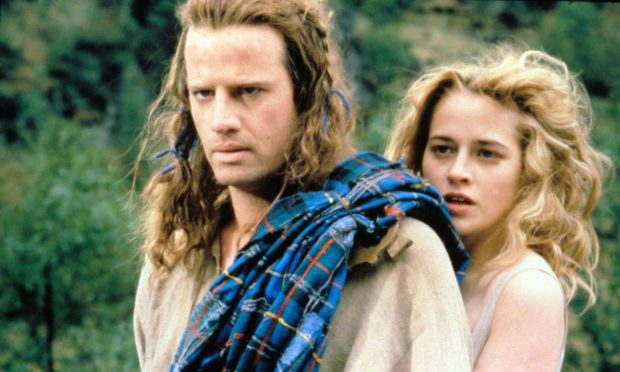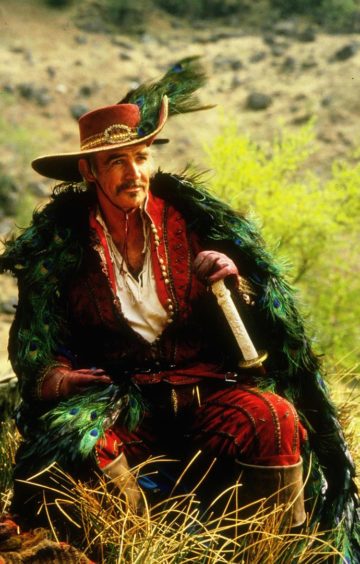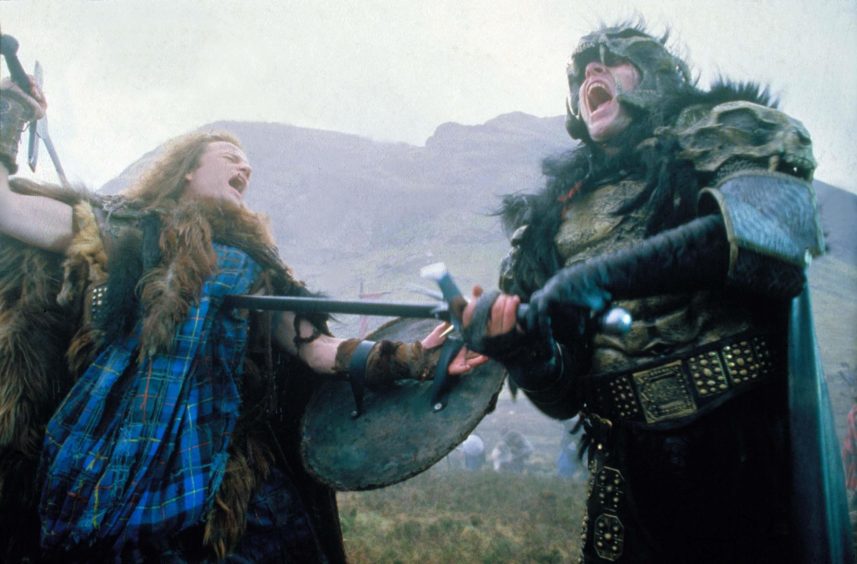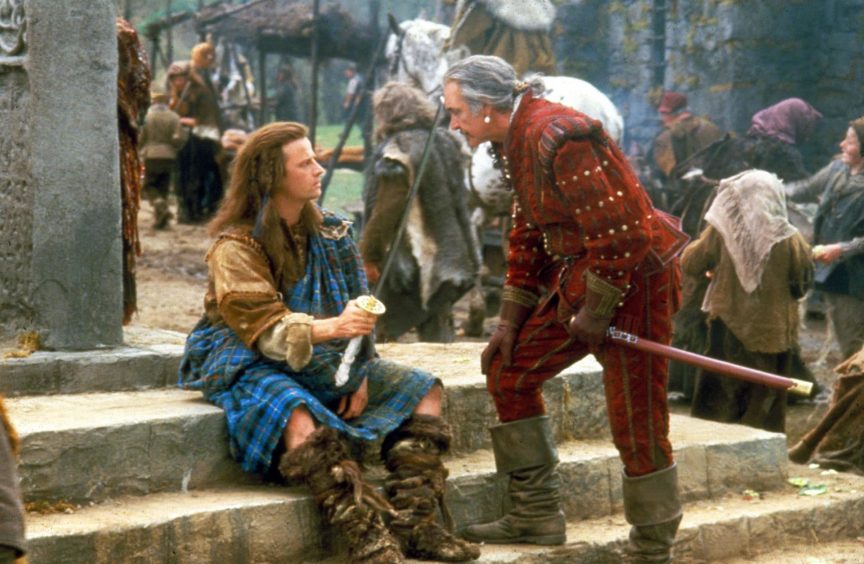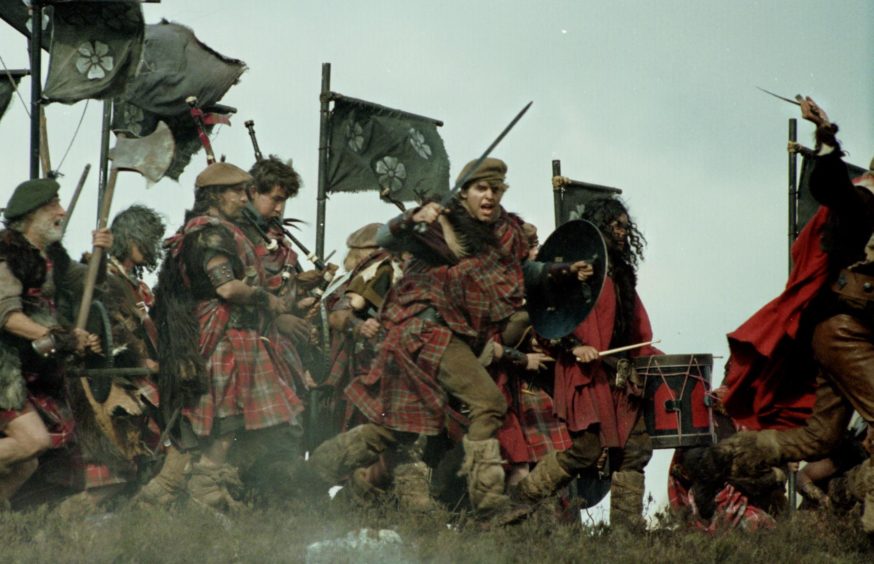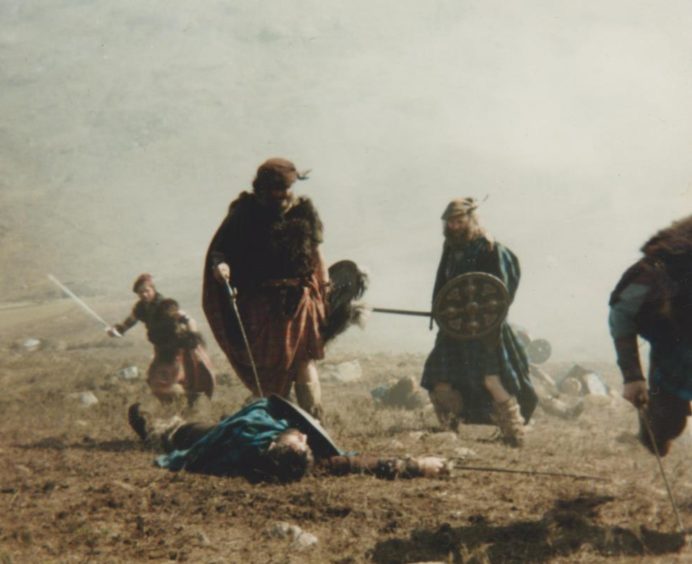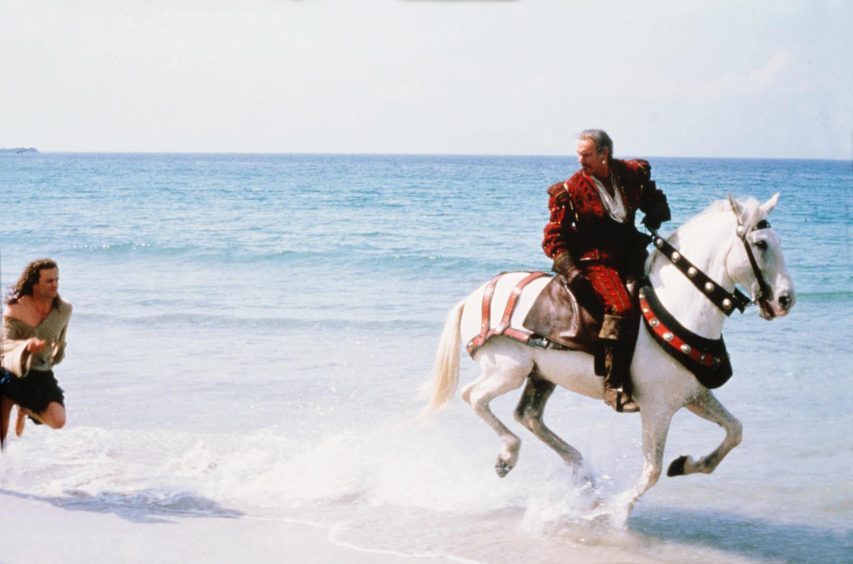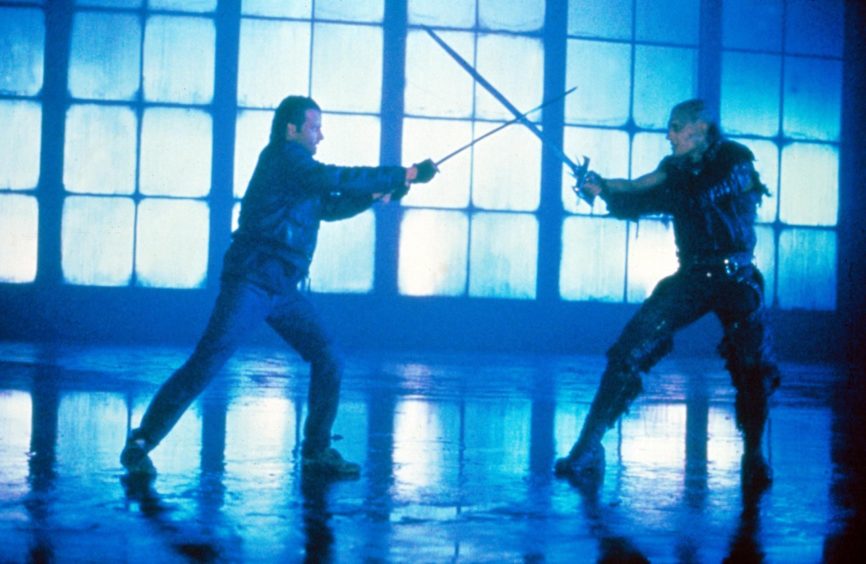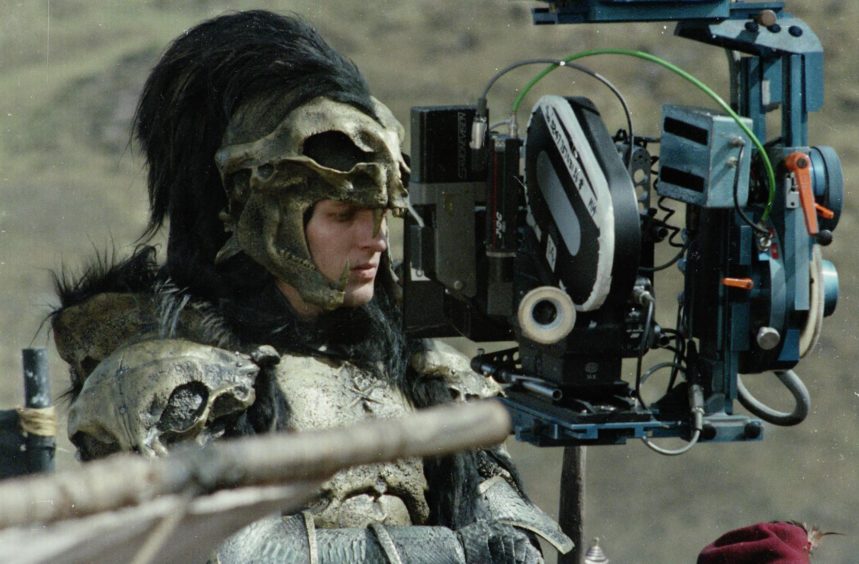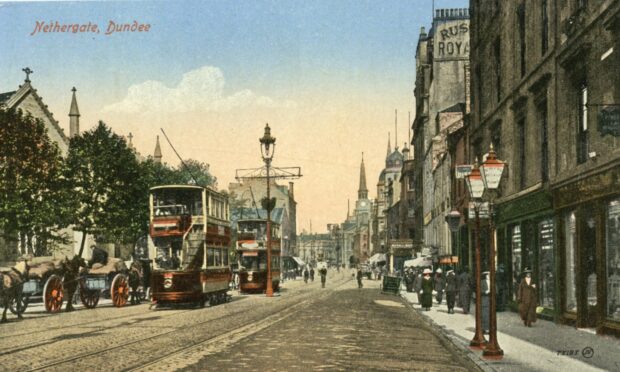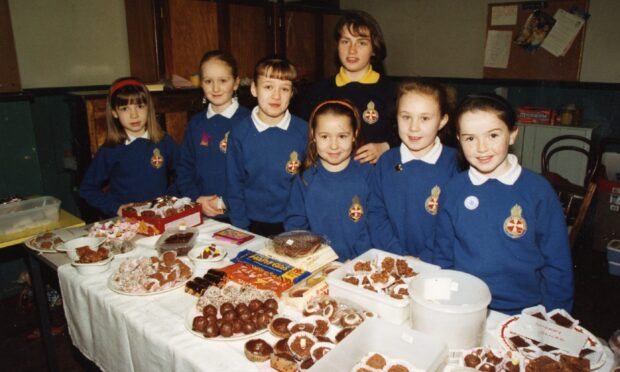Even after 35 years French actor Christopher Lambert remembers the gruelling weeks of training to prepare for his starring role in cult classic Highlander – and not just for the sword fights.
He put as much time and effort into trying to get his Scottish accent right to play the immortal Connor MacLeod – helped along the way by Aberdeen-born acclaimed voice coach Joan Washington.
“Christopher talks about the voice coaching being almost as intensive as learning the choreography for the sword fights because he had to spend weeks and weeks trying to learn this,” said Jonathan Melville, who has just published the definitive book on the making of the original Highlander film, A Kind Of Magic.
“And he did have Sean Connery acting opposite him. He did say Sean Connery would (give) him the odd tip on how to say the words right. He quite enjoyed it.”
Was there no Doric involved in Joan’s coaching work with Lambert?
“Maybe that was in the cut scenes,” laughed Jonathan, a freelance journalist and author whose book about the movie, filmed in 1985, was released in the UK in September and is coming out in the US next month.
Much has been made of just how Scottish Lambert’s on-screen accent was, although Jonathan thinks he did well.
“There’s a nice line later on the film in which someone asks where he’s from and he says ‘lots of different places’. I think that’s quite clever and almost an in-joke and nod towards that accent.”
Stunning Scottish locations
Jonathan has long been fascinated by Highlander, a tale of Immortals living among us, battling over centuries to be the last one remaining and decide the fate of humanity.
It boasted stunning locations across Scotland from Glen Coe to Eilean Donan Castle, Torridon to Skye. All of this played out to an iconic soundtrack by Queen.
“I first saw it at a midnight cinema screening in 1994, having missed it on video and DVD. I just fell in love with it. It has a bit of everything. It has action, a bit of comedy, fantasy and romance and, of course, Scotland,” said Jonathan, saying the film was a showcase for the country.
“Although, of course I can see the absurdities of a Frenchman playing a Scotsman and Sean Connery playing a Spaniard, who is actually Egyptian.”
Jonathan decided since no one had written a book about the making of the film, he would. And he was lucky enough to secure interviews with key players in the film, including Lambert, the director Russell Mulcahy, Clancy Brown – who played the villainous Kurgan – and Roger Taylor and Brian May of Queen, who wrote the soundtrack.
The band members got on board with Highlander after being sent the script and shown excerpts from the film in a cinema in London.
“They had very positive memories of the film,” said Jonathan. “Roger told me that Freddie Mercury said it was the best script he had ever read. They all had different responses to it.
Brian May’s bucket list
“Brian May was going through a difficult period of his life at the time, with family members being ill. When he watched the sequence with Connor and Heather and she dies, that resonated with him. When he was in the car driving back to his flat, he started writing the lyrics for the song, Who Wants To Live Forever. That was within a couple of hours of watching it and that says something.
“Also, 1985 was the year of Live Aid, so they were huge at that point. So to take time out to do Highlander was quite a big thing.”
Other tracks on the film soundtrack include A Kind Of Magic, One Vision and Gimme The Prize, which all featured on Queen’s 12th studio album, A Kind Of Magic.
“There had been talk of doing an official soundtrack for Highlander, but in the end they decided to do their own album. There has never been an official soundtrack for Highlander, sadly, but speaking to Brian, he did say it’s on his bucket list to do one. That was quite exciting to hear.”
Central to the film is, of course, Sean Connery as Ramirez, Macleod’s fellow Immortal, friend and mentor. It is surprising to discover Connery was only on set for four or five days.
“He was staying in a castle near Fort William and he was flown in by helicopter and flown around Scotland, so I think he had a good time. People I spoke to said he was always very polite and friendly with fans who came up to him.
“There were some really nice stories about Sean. The make-up artist, Lois Burwell talks about lying in the bottom of the boat when they were shooting a loch scene, with her head underneath Christopher Lambert’s bottom and Sean Connery at the other end of the boat. She was just trying to stay out of sight so she could do the make-up in between takes.”
Thatcher effigy burned
But Connery’s presence was enough to help settle some unrest among the hundreds of extras taken on for the movie’s stunning battle scenes in and around Glen Coe.
“Like any film, producers watch the pennies but sometimes that can get to extreme levels,” said Jonathan. “When it came to feeding the hundreds of extras, on the first day the decision was made they weren’t to be given breakfast. This caused quite an outcry, the crew was saying if you don’t feed them they will leave as well as saying it’s just not right to not feed them.
“It was mentioned by one of the assistant directors that if it wasn’t sorted out he was going to get Sean Connery involved. That jolted the producers into saying ‘okay, we’ll feed them’. But it did result in a little bit of antagonism between the extras and the producers.”
Which led to the small matter of Prime Minister Margaret Thatcher being burned in effigy by the largely Scottish extras, to the bemusement of the mostly London-based film crew.
“I think the whole not feeding the extras had a bit of a knock-on effect. A lot of the crew were coming up from London and this was around the time of Margaret Thatcher being in power,” said Jonathan, adding at the time she was a hate figure for a large part of Scotland.
“Maybe some of the extras felt they would just wind up the crew, but I think it surprised a few people that an effigy of Margaret Thatcher was burned.”
That wasn’t the end of some of the more quarrelsome aspects for the extras. During filming of the battle scenes, a bit of argy-bargy broke out between some of them. Some of the punches you see on screen were being thrown for real.
“There was a little bit of tit-for-tat when one extra would maybe rap the person he was fighting across the knuckles with the wooden sword. In the next take the person hit would do the same back and it maybe got a little bit out hand at times,” said Jonathan.
It rained everywhere
“I think there were a few punches thrown. One extra said it might have had to do with the amount of alcohol consumed at lunchtime, but another said it was more to do with adrenaline. Maybe it was a bit of both, because a lot of the extras were professionals.”
“Although the common theme that came out of my interviews was rain,” said Jonathan. “Everywhere they went it rained. There are memories of running around in the mud and having to wear welly boots that were covered with hessian and made to look like they were of the period.”
The result was, of course, a cult classic. Savaged by critics at the time it has gone on to be much-loved and massively popular, with several sequels (of diminishing returns) and a spin-off TV series.
But many of those fans might be surprised at just how lo-fi the making of Highlander was, despite all the action, explosions and lightning effects, said Jonathan.
“In the opening sequence when Christopher Lambert is fighting, the swords are giving off sparks. They had car batteries behind them and wires going up through their arms and into the metal to make it spark.
“And there’s a sequence just before Sean Connery’s Ramirez is killed and a tower they are in collapses. In one scene you can see someone holding up the bricks behind the wall, just for a split second.
“Although it looks big and exciting and explosive, it was just guys behind them, pulling cords and things like that.”
Jonathan reckons the popularity of Highlander is down to its central premise.
Who wants to live forever
“People love that immortality idea that you can live forever and witness history, be there during all these amazing times. I think people respond so well to this character of Connor MacLeod who is fighting for good and to protect people. There is a romantic side to that,” he said.
“We would all like to be immortal, even if just for a few centuries. I don’t think I’d like to live forever.”
Highlander’s original promotional tagline was “There can be only one”. That is no longer the case, with a reboot being mooted, helmed by Chad Stahelski, the director behind the John Wick films, starring Keanu Reeves.
“I think they should redo it,” said Jonathan.
“We will always have the original which many people love. But when I spoke to Clancy Brown he thought it should be remade, because you could only make it better in his opinion. He said the original was done with bits of string and Sellotape holding it together. These days with all the amazing techniques, you could make it look incredible. And I agree.
“The story of this man who lives through the centuries and lives and loves and loses people and gains new people, that’s a story that deserves to be retold.
“And, of course, let’s get Scotland back on the big screen again, let’s get Eilean Donan back on there and get more tourists across here.”
